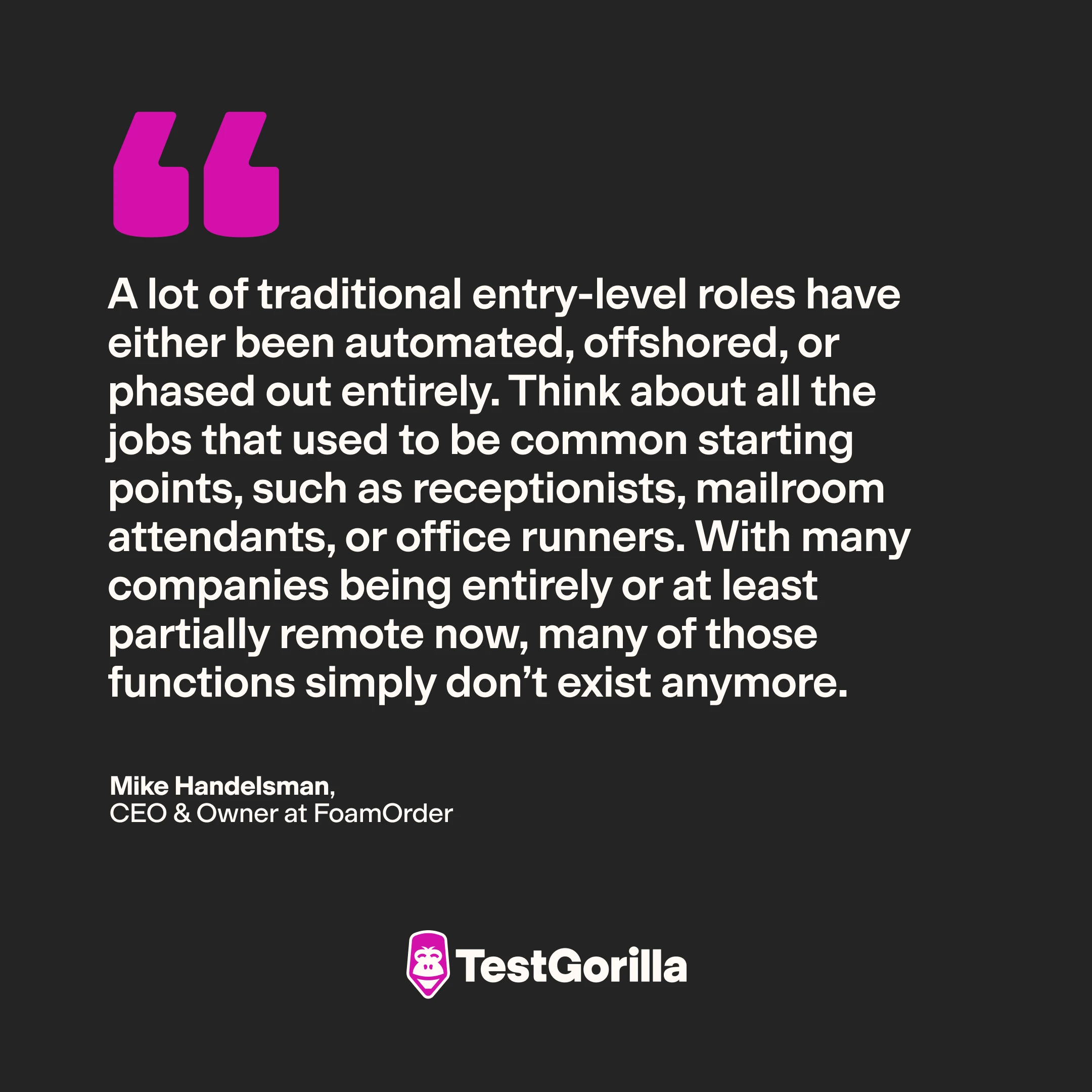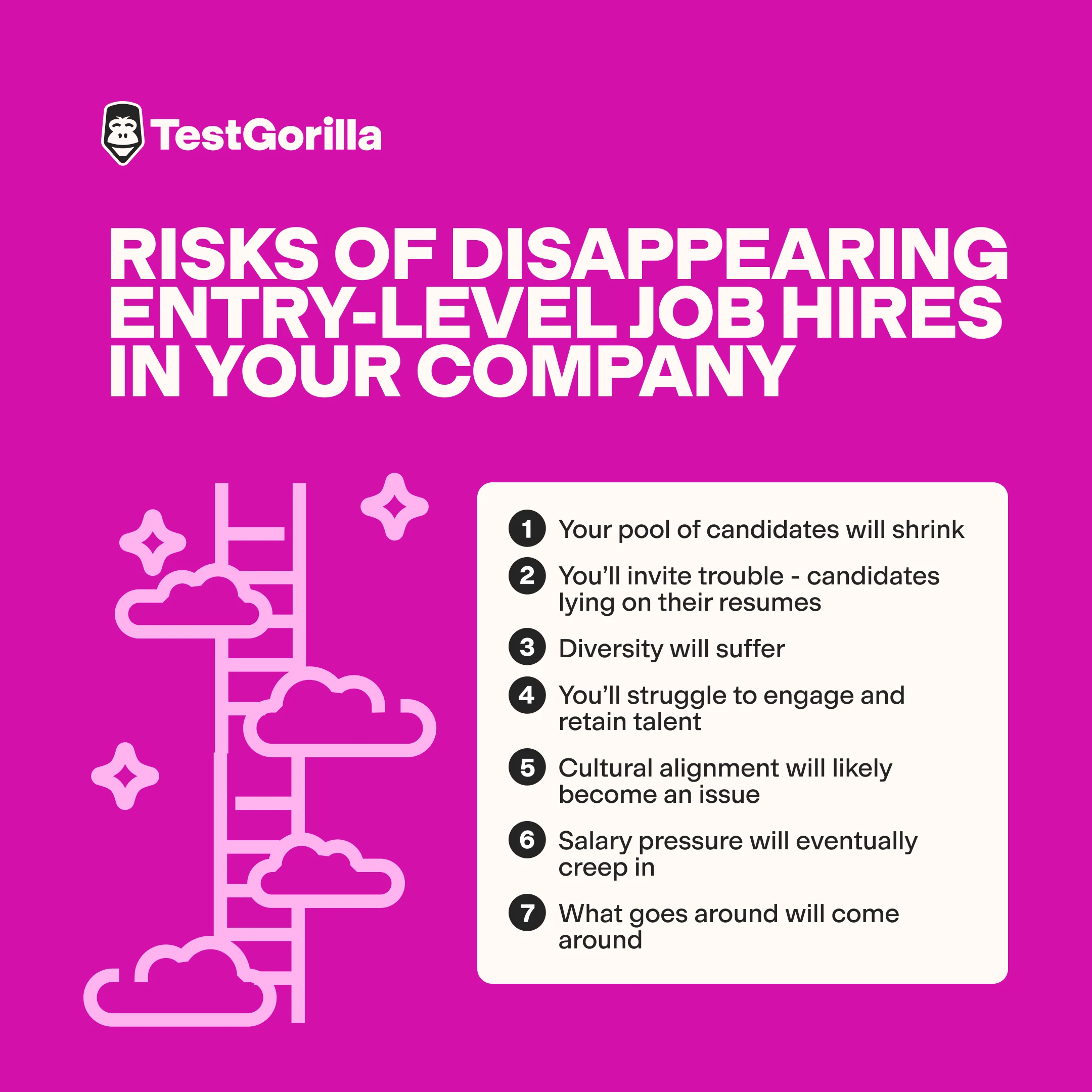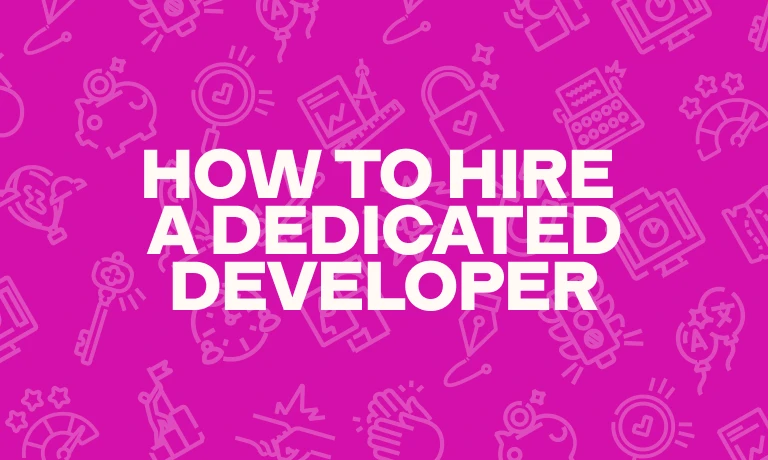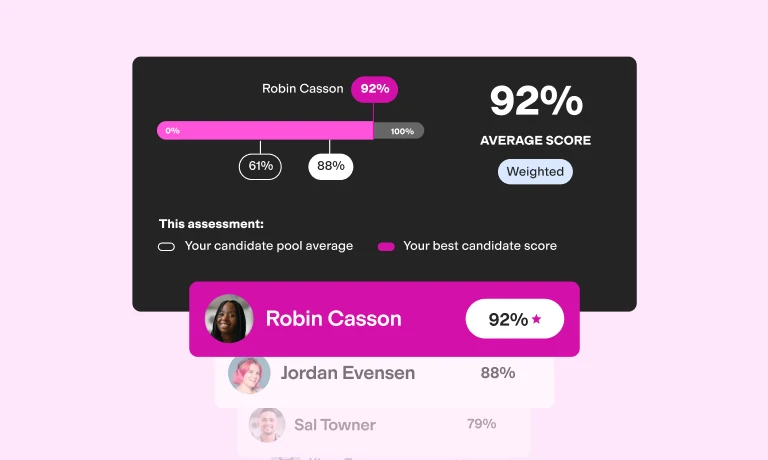The vanishing first rung: What’s happening to entry-level jobs?
According to our latest State of Skills-Based Hiring report, 70% of candidates say they’re struggling to land a job.
But no one’s feeling it more than entry-level job seekers.
The first rung of the career ladder – once a reliable step up – is disappearing. Many of today’s entry-level jobs have either vanished or become virtually inaccessible.
It’s a mess, and it isn’t just job seekers who are suffering. With the first rung vanishing, there’s plenty to lose for employers, too.
What are entry-level jobs?
Entry-level roles comprise the first rung of the career ladder. They’re the jobs that help people get their first breaks, learn the ropes, and build real-world skills for their dream jobs. Think interns, call center reps, administrative assistants, data entry clerks, junior analysts, retail associates, or support staff.
Historically, entry-level positions were never about perfection or instant results. They were about finding and investing in people with potential who can grow their career paths and contribute their skills back to the company – a win-win for both employers and employees.
But now, that first step is slipping out of reach.
Some starter jobs are genuinely obsolete
“Entry-level jobs are like starter homes: they don’t exist anymore.” – Anonymous job seeker on Redditor
We spent days scouring Reddit, LinkedIn, and other online platforms to gather unfiltered opinions from real job seekers and employers about the current state of entry-level roles. We saw dozens of posts about individuals feeling defeated by the job market and hopeless about their chances of getting their feet in the door of the professional world.
But why is this? What’s happening to entry-level work?
We spoke with Mike Handelsman, CEO & Owner at FoamOrder, who gave us a compelling perspective on the current situation:
"A lot of traditional entry-level roles have either been automated, offshored, or phased out entirely. Think about all the jobs that used to be common starting points, such as receptionists, mailroom attendants, or office runners. With many companies being entirely or at least partially remote now, many of those functions simply don’t exist anymore.”
In other words, the rise of tech, AI, remote work, and globalization has led to the elimination of certain junior roles.
We don’t blame companies for staying ahead of these trends, especially at a time when everyone is being cost-conscious and tech-forward – but this isn’t the full picture.
The best insights on HR and recruitment, delivered to your inbox.
Biweekly updates. No spam. Unsubscribe any time.
Entry-level ≠ entry-level anymore
Today, you’ll still see job ads for a marketing assistant, a clinic receptionist, or a junior waitstaff member – roles that seem like the first step in someone’s career. There’s just one problem: These “entry-level” roles are no longer available to starters.
As one of many job seekers observed on Reddit, “Most white collar jobs will claim to be entry-level but require 2–3+ years of experience. It’s rare for me to find a job posting that requires under 1 year or is an opportunity for professional growth."
What we’re dealing with here is an access problem, which is putting candidates in a tough spot. They need a job to get experience, but they need experience to get a job.
We spoke with several industry experts to gather their perspectives on these circumstances. Here’s what seems to be happening:
There’s a demand-supply imbalance
Many employers are currently dealing with surging application volumes. This is partly because AI tools make it easy to apply in seconds, and partly because automation has eliminated many roles, leaving more candidates competing for fewer jobs.
Emily Ruby, Attorney & Owner at Greenberg and Ruby Inquiry Attorneys, shared insight into how this influx of applicants is affecting the entry-level job market. When job boards get flooded, she told us, employers “try to cope by demanding more: extra credentials, unpaid experience, [and] professional polish at 22.”
The oversupply leads to inflated expectations, which make starter roles inaccessible to those without privilege, connections, or years of experience.
Companies can’t be bothered to train newbies
We peeled another layer of the onion in our conversation with Mike Handelsman, who said, “Right now, employers are seeing lines of applicants with two or three years of experience applying for positions in almost every field out there. So the question is: why hire someone brand new if you can bring on someone already trained?"
This lack of motivation to train employees isn’t just about having access to more experienced folks. It’s also about the landscape companies currently face. As Hailey Roader, Marketing Director at Engrave Ink, shared with us, “Businesses want potential candidates to be prepared to step into a fast-paced and ever-changing work environment. Consequently, companies expect new hires to be productive immediately.”
Human resources and hiring expert Yashna Wahal also shared a similar perspective when we spoke with her:
“Companies are also dealing with factors like higher competition, economic uncertainty, and tighter budgets. They don’t have the luxury of time or money to train people from scratch anymore, especially at the risk that their peers will race ahead. It’s all become very cutthroat.”
Employers want gold at the price of coal
There’s also a whole other school of thought around why entry-level jobs have evolved in this way: Some companies want top talent without paying top dollar. So, they repackage advanced jobs as “entry-level” to justify a lower salary or offer unpaid internships where juniors do valuable work for free.
Unsurprisingly, much of this viewpoint comes from candidates. For example, one Redditor sarcastically wrote, "Entry level is now defined as ‘those with 3–5 years experience, but you’re still classed as a junior, but we need your skills to be of a senior, but we will lowball you and pay you like a junior.’”
We’re not saying all employers are doing this, but it is happening.
Why the vanishing first rung will inevitably lead to your downfall
On the surface, it appears that these circumstances harm only job seekers. But the reality is starkly different.
Your pool of candidates will shrink
By demanding college degrees or several years of work experience in entry-level job descriptions, you’re shutting the doors to newcomers or career switchers who genuinely have the skills for the job or the potential to acquire them quickly.
You’ll invite trouble
With entry-level job applicants in a state of desperation, don't be surprised if you end up hiring candidates who fibbed about their work experience in their resume or cover letter. In fact, 70% of candidates have confessed to lying on their resumes.
Diversity will suffer
Speaking to TestGorilla, Emily Ruby explained that when employers demand formal credentials, professional experience, and unpaid labor, they’re essentially filtering for privilege.
She’s right. Individuals from more privileged socioeconomic or ethnic backgrounds are significantly more likely to:
Become college graduates.
Gain summer internships and on-the-job training programs through their connections.
Accept a low-paid or unpaid entry-level job offer because they can afford to.
The result? A workforce that lacks diversity – not just in race or socioeconomic background, but in skills, perspectives, and lived experience.
You’ll struggle to engage and retain talent
Hiring experienced talent into junior roles is a recipe for turnover. These are smart, ambitious people who accepted a step down because of the state of their market. They’re less likely to be engaged in their work and more likely to trot off the second something better comes along, leaving you to foot the bill for rehiring, onboarding, and retraining.
Cultural alignment will likely become an issue
When you stop hiring true newcomers, you lose the opportunity to train and mold eager new talent to your company’s culture, values, and working practices. People with more experience come in with fixed habits and ways of working, so you could end up with someone who isn’t a good fit, resists your company’s ways, or is less open to feedback.
Salary pressure will eventually creep in
Even if experienced professionals initially accept junior wages, don’t expect it to last. Referring to some of her first-hand experiences, Yashna Wahal, HR expert, shared, “They’ll quickly push for promotions, raises, and new responsibilities. And if you give 'entry-level' employees an uptick, your middle managers might demand it, too.”
What goes around will come around
In our conversation with Mike Handelsman, we gained insight into the demand-supply balance in the labor market:
“The reality is that it's a cycle. [...] Just a few years ago, it was the exact opposite: companies were desperate to fill seats, and being ‘grossly underqualified’ wasn’t always a dealbreaker. This will again be the case in a couple of years.”
If you’re not giving new entrants a chance or investing in their training and development today, they’re much less likely to apply to your company when the tables turn (which they will).
Moreover, if they’ve expressed their frustrations about your company on platforms like Glassdoor or LinkedIn, it’ll damage your employer brand and candidate appeal for others as well.
Rebuilding your first rung: Focus on skills, not experiences
The good news is that you can rebuild your first rung in a way that works well for today’s fast-moving, competitive, and cost-sensitive environment. According to Hailey Roader from Engrave Ink, “Organizations need to challenge the traditional job ladder. [For] the first rung, [you have] to base hiring on perceived potential and a willingness to learn.”
And skills-based hiring does exactly that.
A skills-based approach focuses on hiring candidates for their real-life skills – what they can actually do – and their attitudes and behavioral attributes, rather than their education or background.
This means you can tap into a much broader, more diverse pool of talent that isn’t limited to recent graduates or the privileged – it’ll include career switchers and people who have gained skills through alternative routes, such as certifications, micro-credentials, hands-on learning, and more.
The best way to do this is through TestGorilla’s talent assessments.
Our library offers “350+” tests created by experts.
You can test your newcomers’ existing hard skills and industry knowledge for roles that absolutely need it – for instance, assessing coding or programming jobs.
But you can also assess soft skills, cognitive abilities, personality traits, and cultural alignment with your company. This can help you spot candidates with high potential, transferable skills, and the right aptitude, who’ll likely hit the ground running and need minimal training.
Moreover, entry-level skills-based hiring gives you the confidence to invest in paid internships or apprenticeships, which are excellent ways to provide rather than demand experience. But this time, you’re not picking someone at random or providing free training – you’ve already seen what they can do.
Overall, skills-based tests help you open doors, build people up, and create the kind of loyalty and growth that trumps any competitive edge you could possibly have from removing your first rung.
Build a ladder that everyone can climb with TestGorilla
True entry-level jobs seem to have disappeared from today’s job market. While some have been automated, outsourced, or made redundant, others are buried under unrealistic demands – degrees, years of experience, and polish that most new candidates simply can’t offer.
This change may seem like a sign of innovation or efficiency. But it’s quietly weakening your company’s future through narrow talent pipelines, poor retention, a lack of diversity, and costly mis-hires.
Thankfully, there is a way to make progress, save money, and beat the competition without eliminating your first rung. Skills-based hiring, with a platform like TestGorilla, enables you to confidently assess every candidate’s real skills, potential, and cultural alignment, so you can hire someone who contributes quickly, grows with your company, and stays longer.
Keen to explore our tests? Create your free TestGorilla account today.
You've scrolled this far
Why not try TestGorilla for free, and see what happens when you put skills first.




















